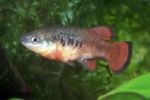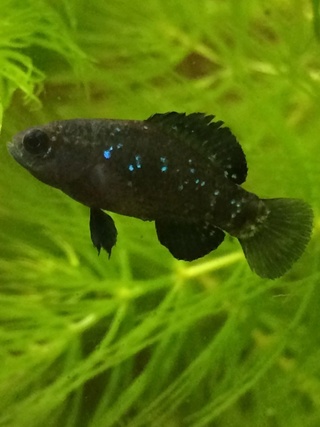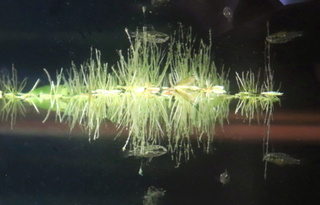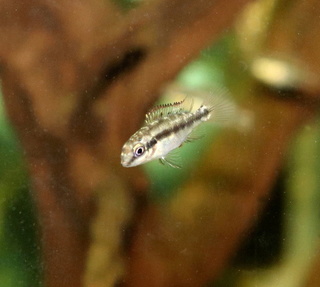Alkalinity, what's that all about?
4 posters
:: Freshwater :: Freshwater General
Page 1 of 1
 Alkalinity, what's that all about?
Alkalinity, what's that all about?
With all the new koi coming soon I have been doing a considerable amount a research to insure I am fully prepared for the new arrivals. Well the more I read the more I realize the less I know 
Last week I was reading an article that was preaching the importance of testing the alkalinity of your water. It was one of those “bang head here” moments. Being that I deal with water every day at work that essentially has no alkalinity in it I should know better. We constantly have to deal with the lack of alkalinity and the wild PH swings it brings to our irrigation water. The truth is up until last week I had never tested the alkalinity of any of my fresh water tanks (I regularly check it in my SW tanks) in 25+ years of fish keeping.
Sooooooo
I check my Koi tanks and guess what? It would not even read it was so low, not that I was surprised really. In the test you put one drop of the reagent in the sample and the sample should turn blue. You continue to add the reagent one drop at a time until it turns yellow. Well my sample turned yellow with the first drop.
For those of you not familiar with the importance of Alkalinity in your water, it is a buffer to the PH. It helps prevent the PH from swinging wildly in one direction or the other when something changes in your system. Something that I also found out is that it can change radically throughout the day with little to no Alkalinity. I would randomly check my PH of my tanks but never really put any though into the time of day I did it. For Koi/Goldfish, anything greater than .3 of a change in PH through the day can be deadly. I consistently get readings in the 7.2-7.4 range which is where my tap water is.
Well I stated testing at sun up to sundown one day about every hour. Was I ever shocked…
One tank actually crashed to 5.3 later to recover to the normal 7.2-7.4 range. So to say the least, a trip to the store was in order to buy the biggest box of Arm &Hammer baking soda I could find. I have been slowing adding the baking soda to prop up my non-existent alkalinity. Baking soda is normally around a PH of 8.4 so it will raise your overall PH, but I would gladly deal with a PH in the range of high 7’s that is stable rather than the yoyo that it seems I have had for some time now.
Once I get this all dialed in I will probably start adding a small amount of baking soda to the tanks that I de-chlorinate my water in for the water changes.
Steve
Last week I was reading an article that was preaching the importance of testing the alkalinity of your water. It was one of those “bang head here” moments. Being that I deal with water every day at work that essentially has no alkalinity in it I should know better. We constantly have to deal with the lack of alkalinity and the wild PH swings it brings to our irrigation water. The truth is up until last week I had never tested the alkalinity of any of my fresh water tanks (I regularly check it in my SW tanks) in 25+ years of fish keeping.
Sooooooo
I check my Koi tanks and guess what? It would not even read it was so low, not that I was surprised really. In the test you put one drop of the reagent in the sample and the sample should turn blue. You continue to add the reagent one drop at a time until it turns yellow. Well my sample turned yellow with the first drop.
For those of you not familiar with the importance of Alkalinity in your water, it is a buffer to the PH. It helps prevent the PH from swinging wildly in one direction or the other when something changes in your system. Something that I also found out is that it can change radically throughout the day with little to no Alkalinity. I would randomly check my PH of my tanks but never really put any though into the time of day I did it. For Koi/Goldfish, anything greater than .3 of a change in PH through the day can be deadly. I consistently get readings in the 7.2-7.4 range which is where my tap water is.
Well I stated testing at sun up to sundown one day about every hour. Was I ever shocked…
One tank actually crashed to 5.3 later to recover to the normal 7.2-7.4 range. So to say the least, a trip to the store was in order to buy the biggest box of Arm &Hammer baking soda I could find. I have been slowing adding the baking soda to prop up my non-existent alkalinity. Baking soda is normally around a PH of 8.4 so it will raise your overall PH, but I would gladly deal with a PH in the range of high 7’s that is stable rather than the yoyo that it seems I have had for some time now.
Once I get this all dialed in I will probably start adding a small amount of baking soda to the tanks that I de-chlorinate my water in for the water changes.
Steve

Sbenson11- Support
- Posts : 2627
Join date : 2013-09-08
Location : Mt.Pearl, Newfoundland
 Re: Alkalinity, what's that all about?
Re: Alkalinity, what's that all about?
I thought baking soda was only a temporary fix and the effect lasts only a few days.
What about crushed oyster shells for substrate? Those are cheap if you buy the ones for hens at the farm store... Under $10 for 50 lbs and it would be a slow, steady release.
I have the opposite problem. I add 17 drops before I see yellow in my tests.
What about crushed oyster shells for substrate? Those are cheap if you buy the ones for hens at the farm store... Under $10 for 50 lbs and it would be a slow, steady release.
I have the opposite problem. I add 17 drops before I see yellow in my tests.

nyleveiam- Veteran Member

- Posts : 1383
Join date : 2014-02-05
Location : New Hampshire, USA
 Re: Alkalinity, what's that all about?
Re: Alkalinity, what's that all about?
nyleveiam wrote:I thought baking soda was only a temporary fix and the effect lasts only a few days.
It will be an ongoing thing that I have to add all the time. If I can get it stable and keep it there I will only be a mater of adding a certain amount of baking soda with each barrel of water. This is all new to me so maybe someone with a similar problem might chime in.
I am currently changing out about 100G of water a day.
Steve

Sbenson11- Support
- Posts : 2627
Join date : 2013-09-08
Location : Mt.Pearl, Newfoundland
 Re: Alkalinity, what's that all about?
Re: Alkalinity, what's that all about?
I have never checked pH at different times of day to compare, but my first reaction is that it may have to do with CO2 levels - in planted tanks that are CO2 injected with lights on, the pH goes down during the day, and will rise without Co2 present. Plants will absorb CO2 during photosynthesis which would bring the pH up as it is absorbed but fish activity would have increased CO2 presence early in the day. Also during the night plants will give off a bit of CO2 and absorb some oxygen, so pH would be lower in the mornings and increase later in the day.
Only speculation but that is what I come up with for the reasoning.
Only speculation but that is what I come up with for the reasoning.

sucker4plecos- Angel Fish

- Posts : 279
Join date : 2013-09-15
Location : Kitchener ON
 Re: Alkalinity, what's that all about?
Re: Alkalinity, what's that all about?
What about adding shells to the substrate ?
Every spring I set up the backyard pool. I usually had to add two large containers of alkalinity boost (essentially this is baking soda in a fancy bucket) to bring the water up to desired range. From there I stabilize the pH. So what you say makes sense. The pH is the key condition which affects so much in the water.
Alkalinity is indeed the buffer, or in the absence of alkalinity, the inability for your water to be pH stable. CO2 therefore will affect the unbuffered pH because of the amount of cations competing for the lone hydrogen (the measure of pH).
I think you need a permanent source of buffer inside your tank. Probably, crushed shells are the answer. Baking soda will stay in the water but with water changes you are constantly changing out the added sodium bicarbonate.
Every spring I set up the backyard pool. I usually had to add two large containers of alkalinity boost (essentially this is baking soda in a fancy bucket) to bring the water up to desired range. From there I stabilize the pH. So what you say makes sense. The pH is the key condition which affects so much in the water.
Alkalinity is indeed the buffer, or in the absence of alkalinity, the inability for your water to be pH stable. CO2 therefore will affect the unbuffered pH because of the amount of cations competing for the lone hydrogen (the measure of pH).
I think you need a permanent source of buffer inside your tank. Probably, crushed shells are the answer. Baking soda will stay in the water but with water changes you are constantly changing out the added sodium bicarbonate.

alexmtl- Veteran Member

- Posts : 3274
Join date : 2013-09-07
Location : Montreal Quebec
 Re: Alkalinity, what's that all about?
Re: Alkalinity, what's that all about?
Where I live the water is being sourced from the Pointe Claire water treatment plant. I do regular water changes every seven days so what the treatment plant introduces into its treatment regimen has direct impact on the water in the aquariums in my home.
The Pointe Claire site maintains a "soft" water rating and a hardness at 60-70 mg/L CaCO3. What this means is that calcium amount (60 to 70 milligrams per liter of water of calcium carbonate), known as GH, is desirable. KH is a relative amount and is a variable depending upon the pH. Therefore if you have measuring kit for KH, it will change as your pH changes. GH is dissolved calcium or magnesium, which is referred to as "hardness", ie how hard it is to build soap lather.
What about alkalinity? I do not adjust for alkalinity since the treatment plant needs to add the buffer in order to get the optimum pH and hardness.
In the end, do I add oyster shells (source for buffer and calcium)? Probably not since there is enough GH and buffer in the water from the treatment plant. If I have Rift Lake cichlids requiring high dissolved salts, then I would add, for certain. For my livebearers, I could look into adding a little, but I am not too concerned since they have done fairly well.
The Pointe Claire site maintains a "soft" water rating and a hardness at 60-70 mg/L CaCO3. What this means is that calcium amount (60 to 70 milligrams per liter of water of calcium carbonate), known as GH, is desirable. KH is a relative amount and is a variable depending upon the pH. Therefore if you have measuring kit for KH, it will change as your pH changes. GH is dissolved calcium or magnesium, which is referred to as "hardness", ie how hard it is to build soap lather.
What about alkalinity? I do not adjust for alkalinity since the treatment plant needs to add the buffer in order to get the optimum pH and hardness.
In the end, do I add oyster shells (source for buffer and calcium)? Probably not since there is enough GH and buffer in the water from the treatment plant. If I have Rift Lake cichlids requiring high dissolved salts, then I would add, for certain. For my livebearers, I could look into adding a little, but I am not too concerned since they have done fairly well.
Last edited by alexmtl on Mon May 19, 2014 11:26 am; edited 3 times in total

alexmtl- Veteran Member

- Posts : 3274
Join date : 2013-09-07
Location : Montreal Quebec
 Re: Alkalinity, what's that all about?
Re: Alkalinity, what's that all about?
sucker4plecos wrote:I have never checked pH at different times of day to compare, but my first reaction is that it may have to do with CO2 levels - in planted tanks that are CO2 injected with lights on, the pH goes down during the day, and will rise without Co2 present. Plants will absorb CO2 during photosynthesis which would bring the pH up as it is absorbed but fish activity would have increased CO2 presence early in the day. Also during the night plants will give off a bit of CO2 and absorb some oxygen, so pH would be lower in the mornings and increase later in the day.
S4P refers to the carbonate cycle, which is active in all of our aquariums. Addition of CO2 will lower pH as the addition of CO2 will drive the formation of dissolved CO2 and H2O. The dissolved CO2 in turn will drive CO2 + H2O producing carbonic acid H2CO3. Carbonic acid freely dissociates H2CO3 to HCO3 and H ion. The H ion reduces the relative pH, causing pH measurement as low.

alexmtl- Veteran Member

- Posts : 3274
Join date : 2013-09-07
Location : Montreal Quebec
 Re: Alkalinity, what's that all about?
Re: Alkalinity, what's that all about?
Perhaps confusing with all these abbreviations.
pH : relative amount of hydrogen ions, critical to fish habitat and functioning.
Alkalinity : amount of buffering capacity in the water. Relative to pH. High alkalinity will also affect hardness levels. Carbonate or bicarbonate is used in the terms. However you must be careful as the source for carbonate also may include calcium ( ie oyster shells as calcium carbonate) or sodium ( ie baking soda : sodium bicarbonate) or magnesium (epsom salts). Described as KH, carbonate.
Hardness : GH, amount of dissolved salts : primarily calcium 2/3 and magnesium 1/3
Alkalinity (KH = carbonate) can be increased by adding the oyster shells (contain both carbonate and calcium) which in turn affects the amount of dissolved calcium (GH). There is an inter-relationship, so this is why one parameter is so intertwined with others.
Baking soda will increase alkalinity (KH) without increasing GH. But as it contains sodium may increase salinity (yet another measure).
Calcium carbonate (Tums, oyster shell, sea shells, coral) will increase both KH (bicarbonate component) and GH (calcium).
pH : relative amount of hydrogen ions, critical to fish habitat and functioning.
Alkalinity : amount of buffering capacity in the water. Relative to pH. High alkalinity will also affect hardness levels. Carbonate or bicarbonate is used in the terms. However you must be careful as the source for carbonate also may include calcium ( ie oyster shells as calcium carbonate) or sodium ( ie baking soda : sodium bicarbonate) or magnesium (epsom salts). Described as KH, carbonate.
Hardness : GH, amount of dissolved salts : primarily calcium 2/3 and magnesium 1/3
Alkalinity (KH = carbonate) can be increased by adding the oyster shells (contain both carbonate and calcium) which in turn affects the amount of dissolved calcium (GH). There is an inter-relationship, so this is why one parameter is so intertwined with others.
Baking soda will increase alkalinity (KH) without increasing GH. But as it contains sodium may increase salinity (yet another measure).
Calcium carbonate (Tums, oyster shell, sea shells, coral) will increase both KH (bicarbonate component) and GH (calcium).

alexmtl- Veteran Member

- Posts : 3274
Join date : 2013-09-07
Location : Montreal Quebec
 Re: Alkalinity, what's that all about?
Re: Alkalinity, what's that all about?
So just an update to my alkalinity woes,
I have been doing some reading on a couple of Koi forums that I frequent and there really seems to be no consensus as to how to deal with low to no alkalinity water. However there are enough people who are regularly treating their water with baking soda for me to give it a try.
So I started off adding baking soda at the recommended rate of 1/4tsp per 10gal per day in a 800gal system. The PH started off bouncing all over the place but 4 days in has settled at the expected 8.3 and is stable throughout the day. I am about half way to my goal of 100-120ppm for the alkalinity. Once i reach it i should be able to calculate a rate to maintain it in that range.
Steve
I have been doing some reading on a couple of Koi forums that I frequent and there really seems to be no consensus as to how to deal with low to no alkalinity water. However there are enough people who are regularly treating their water with baking soda for me to give it a try.
So I started off adding baking soda at the recommended rate of 1/4tsp per 10gal per day in a 800gal system. The PH started off bouncing all over the place but 4 days in has settled at the expected 8.3 and is stable throughout the day. I am about half way to my goal of 100-120ppm for the alkalinity. Once i reach it i should be able to calculate a rate to maintain it in that range.
Steve

Sbenson11- Support
- Posts : 2627
Join date : 2013-09-08
Location : Mt.Pearl, Newfoundland
:: Freshwater :: Freshwater General
Page 1 of 1
Permissions in this forum:
You cannot reply to topics in this forum
 Alexmtl
Alexmtl


» Anyone still around? Need help transporting fish
» Stocking suggestions
» New Tank Purchase
» 3 Gallon Tetra half moon tank
» White floaty stuff in gold fish tank
» Ammonia in tap water
» Need advice for beginner with fresh water tank
» Fluval FX5 hose size?
» smart fish, dumb fish, pink fish...um, what rhymes with dumb?
» Is K&E sandblasting sand same as Black diamond?
» What the...is that a leak? NOOOOOOOOOOO!!!!! (a comedy of horrors...)
» Air stones and the noise they make
» aquatic medications
» film like stuff on the water surface of shark tank
» Articles on swordtail behaviour and fathead minnows
» Lets see your predators!
» Humane way to PTS a shark
» My tanks (Introducing myself)
» Build your own aquarium